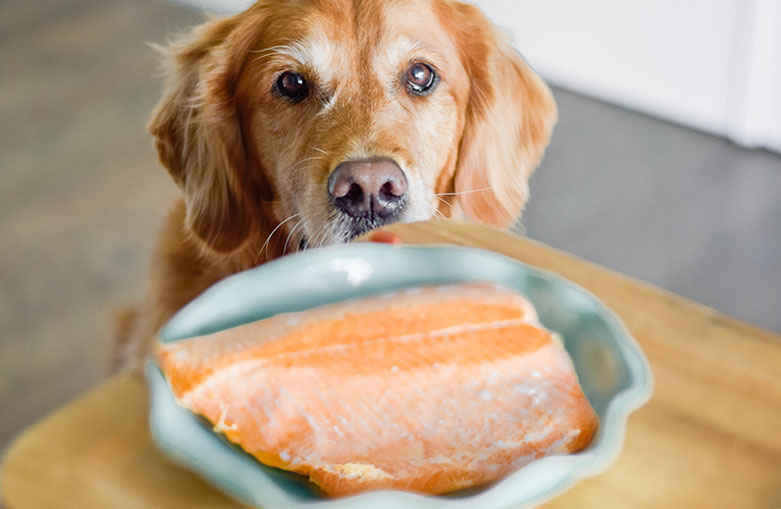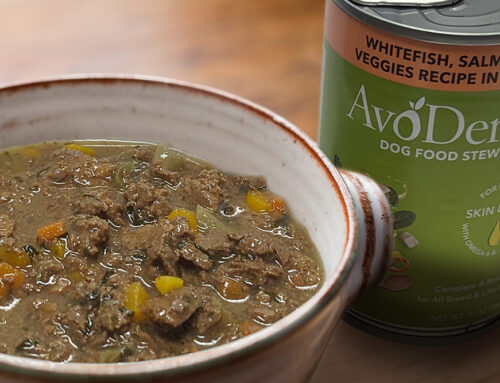Is salmon good for dogs? The answer is absolutely yes. Salmon is nutritious for dogs and is full of Omega 3s and protein. Just make sure it’s fully cooked before giving some to your pup because dogs can get sick from raw salmon. Some types, like smoked salmon, should be avoided, but other kinds are just fine for your hungry pupper.
Salmon Has a Lot of Health Benefits for Dogs
Fully cooked salmon brings a lot of health benefits for dogs (and it’s good for cats too). It’s full of Omega-3 fatty acids, which can help the skin and coat while being high in protein and low in fat.1 Salmon is also packed full of vitamins and minerals.
Salmon Skin Is OK; Smoked Salmon Is Not
While salmon has a host of benefits for our furry friends, not all forms of salmon are safe.
Can dogs eat salmon skin? Giving your dog salmon skin is fine in most cases. It won’t make your dog sick, and the skin is especially high in healthy Omega 3s.2 However, it should be fully cooked and only given in small amounts since a lot of extra fat can be harmful to your dog.3
Can dogs eat smoked salmon? Out of all the types of cooked salmon that your dog can enjoy, you’ll want to avoid smoked salmon. Smoked salmon is typically cured, which means it has a lot of excess salt, and that isn’t good for your pup. In addition, some types of smoked salmon aren’t fully cooked. This means they would run a small risk of having parasites that are dangerous to dogs.
Other Beneficial Forms of Salmon
Any fully cooked salmon can be beneficial for your pup. Just serve a small amount, whether it’s grilled, baked, steamed, or poached. You’ll also want to watch out for tiny bones in salmon fillets, which can hurt your dog.
Canned salmon is also fine but look for the kind that’s canned with water rather than oil. Because salmon is fatty, you shouldn’t feed your dog fresh salmon daily. Once a week is more than enough.
If you want to avoid any confusion, why not look for a healthy dog food that contains salmon as one of its main ingredients? AvoDerm has a Grain-Free Salmon & Vegetables recipe, for example.
Avoid Raw Salmon
One important tip to remember is to never give your dog raw salmon. Salmon (and other wild rainwater fish like trout) can have flatworms with bacteria that are dangerous to dogs. Weight loss, lethargy, stomach upset, and a loss of appetite are among the first signs that something’s wrong. This is more prevalent in the northern Pacific parts of the U.S. or Canada. You can avoid the risk entirely by not feeding your dog raw salmon. If you live in an at-risk area, you’ll also want to make sure your dog can’t get into garbage where raw fish might have been tossed.
You’ll also want to avoid salmon that is cooked with other ingredients that are harmful to dogs. For example, your dog shouldn’t eat salmon cooked with onions or garlic. Instead, opt for a little bit of plain, fully cooked salmon.
Salmon is one of the many types of fish that can be a great addition to your dog’s diet when fully cooked and served in small quantities. Or to keep things simple, try a tasty dry dog food or canned dog food that has salmon as the main ingredient.
1. Williams, Colleen. “Can Dogs Eat Salmon?” Healthy Paws, 15 May 2017, https://www.healthypawspetinsurance.com/blog/2017/05/15/can-dogs-eat-salmon.
2. Sailer, Cecily. “Can My Dog Eat Fish Skins?” Rover.com, https://www.rover.com/blog/can-dog-eat-fish-skins/.
3. Reisen, Jan. “Can Dogs Eat Salmon?” AKC, 19 July 2017, https://www.akc.org/expert-advice/nutrition/can-dogs-eat-salmon/.





